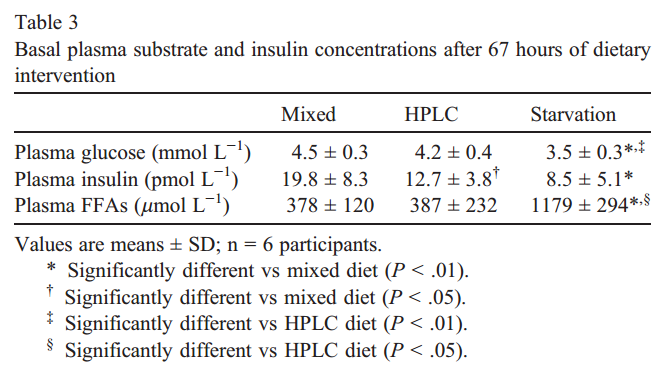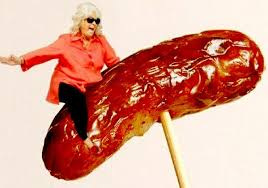#Low-carbohydrate diet does not affect intramyocellular lipid concentration or insulin sensitivity in lean, physically fit men when protein intake is elevated
Test of 67 hrs of a High Protein Low Carb (HPLC) diet vs Balanced diet vs Starvation. It’s not testing keto-adaptation, it’s testing to see if a high protein version of a low carb diet forces the body to adapt away from a glucose burning metabolism like a high fat version does.
#Primary Finding
In lean, healthy men, carbohydrate restriction in the form of 3 days of HPLC diet does not cause any change in circulating FFA concentration, whole-body insulin sensitivity, or vastus lateralis intramuscular lipid concentration compared with 3 days of mixed, carbohydrate-containing diet.
In other words when you have a High protein version of a low carb diet, you get so much glucose produced that your brain is getting sufficient glucose that your body doesn’t even need to adapt to glucose sparing.
The almost identical fasting plasma glucose and free fatty acid (FFA) concentrations after the HPLC and mixed diets, and the marked differences after starvation (Table 3) suggest that there was a continuing supply of glucose entering the blood throughout the HPLC condition.

To the authors’ knowledge, no study has measured the rate of gluconeogenesis or gluconeogenic enzyme activity in humans who have consumed a high-protein/very low carbohydrate (b5% of energy from carbohydrate) diet. However, where carbohydrate is not eliminated, increased protein intake up-regulates gluconeogenesis. Humans who routinely consume greater amounts of protein have increased overnight-fasted hepatic glucose output and an increased proportion of hepatic glucose output from gluconeogenesis (∼65% vs ∼45%) compared with controls matched for age, sex, body mass index, and energy intake.
##In other words;==
#Conclusion
Normal levels of plasma glucose, plasma Free fatty acids, Intra myocellular lipids (marker of Insulin resistance),and insulin sensitivity are maintained when an HPLC diet is consumed, despite other forms of carbohydrate deprivation producing marked changes in these measures.
My read is if you get high enough protein (65% of energy) on a low carb diet, it becomes a regular glucose burning diet and no longer meets many of the other standards of a low carb diet. Of course you don’t make ketones with FFA and insulin at those levels.
Here’s the paper in case you want to read it
green2010.pdf (363.2 KB)



